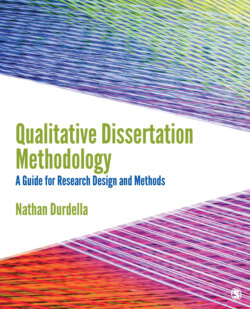Читать книгу Qualitative Dissertation Methodology - Nathan Durdella - Страница 24
На сайте Литреса книга снята с продажи.
Key Questions to Ask Yourself
ОглавлениеWhat dimensions of my dissertation study are out of my control early at this point?
As a researcher, how can I anticipate what may challenge me in the dissertation research process?
What strategies may be available to address challenges that arise in my dissertation research work?
Human element aside, fieldwork often involves intersections of race, ethnicity, gender, culture, and class—with substantive effects on the course of data collection and analysis and the experiences of researchers and research participants. Indeed, these identity categories and positionalities generally shape interaction, and outcomes, in the field. And when a research project explicitly examines issues related to the experiences of marginalized, excluded, or subjugated members of society or explores problems that require dramatic social change to address, fieldwork can be especially challenging. As a qualitative researcher, you need to reflect on how comfortable you are with varying levels of uncertainty in field relations and complexity in social dynamics (and emerging patterns from data collection). You can start by asking foundational questions such as: Who am I as a researcher and what roles do I have in my study? What are my identities and with which groups do I identify?
How you shape your study is worth a closer look (here briefly and in much more depth later in the book—Chapters 3 through 7 with an extended discussion in Chapter 8). When qualitative research forces researchers to interact socially, they assume a central position in their studies. Granted, we tend to admit that as qualitative researchers we shape our projects, but the acceptance and advancement of the idea that we are the chief research instrument in empirical investigations distinguishes our work. Miller and Crabtree (1992, p. 5) describe how a “field researcher is directly and personally engaged in an interpretive focus on the human field of activity with the goal of generating holistic and realistic descriptions and/or explanations.” This personal and direct involvement positions researchers to function as instruments—from conceptualization to implementation to interpretation at all phases of the fieldwork processes and stages in the research project. The sooner you consider how you are at the center of your study and account for your effects as a researcher on whom you encounter in the field, the more likely you are to feel more comfortable with ambiguity and enhance the trustworthiness of your data and produce an overall credible study. Here, start by asking the following questions: How does who I am and how I see myself shape my study? How can I account for my roles and their effects on participants? We will discuss tools to take stock of who you are and to mitigate the research effects on participants of who you are in the field in Chapter 8.
Your goal now is to build a foundation for a successful dissertation study in your work on the background and approach to how you will gather and make sense of information. Your current focus should be on the foundational elements of designing and executing a doable qualitative dissertation study—an overall design and methods, specific procedural steps in data collection and analysis, and plans to write an interpretive story of results of data analysis. As you do this early work in study development, you need to account for the unique characteristics of qualitative research—potential challenges in data collection in the field and issues with data analysis and write up after you leave the field.
